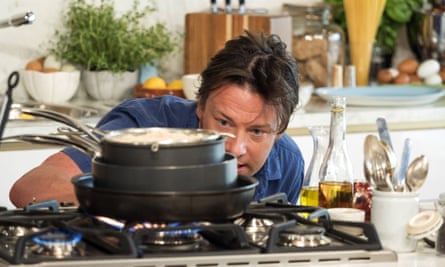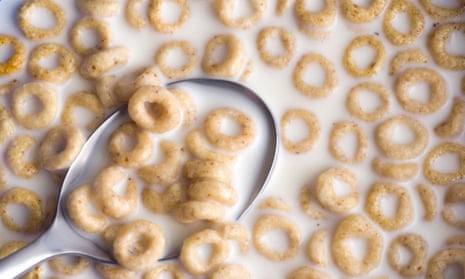Children in England consume half their recommended maximum daily intake of sugar at breakfast, and by the end of the day have had more than three times the healthy limit, according to research from Public Health England (PHE).
The study, based on the annual National Diet and Nutrition Survey, found that on average children have the equivalent of three cubes – about 11g – of sugar before they go to school, mainly in sugary cereals, drinks and spreads. Despite this, researchers found that eight out of 10 parents believed their children’s breakfast was healthy.
PHE is launching a campaign to raise awareness of health problems linked to excessive sugar intake. It has developed an app that allows people to scan products’ barcodes to see how much sugar, saturated fat and salt they contain.
“Children have far too much sugar, and a lot of it is before their first lesson of the day,” said Alison Tedstone, PHE’s chief nutritionist. “It’s crucial for children to have a healthy breakfast, but we know the mornings in a busy household can be fraught. That’s why we’ve developed our Be Food Smart app, taking some of the pressure off parents and helping them to choose healthier food and drink options for their children.”
The recommended maximum daily sugar intake for four- to six-year-olds is five cubes of sugar, and for seven- to 10-year-olds it is six cubes.
The PHE study based on a representative survey of 1,000 people found that children under 10 consumed on average more than three times those quantities.
Sara Stanner, science director at the British Nutrition Foundation, said: “When analysing a number of breakfasts from families across England, we were concerned to see the high amount of free sugars and low amount of fibre in many of these.
“We know a healthy breakfast can make an important contribution to children’s vitamin and mineral intakes and its consumption has been linked to many positive health outcomes. There are plenty of healthier options available so we need campaigns like Change4Life to help busy parents make the right choices for their families.”
The Obesity Health Alliance, a coalition of more than 30 leading charities, medical colleges and campaign groups, also welcomed the move, saying online tools that allowed people to check sugar and fat in products could help parents and families make better food choices.More than one in five children are overweight or obese when they start primary school, rising to more than a third when they leave.
Theresa May’s government was widely criticised in 2016 after it watered down previous commitments to place restrictions on junk food advertising and on unhealthy product placement in supermarkets.

The chef and campaigner Jamie Oliver accused ministers of letting down young people, and parents describing the childhood obesity strategy as “the same old bull [that] hasn’t worked for 20 years”.
As part of the strategy, the government is expected to bring in a sugar tax from April 2018, which will put up the price of sugary soft drinks. It has faced pressure from the soft drinks industry to reduce or scrap the levy.
The Obesity Health Alliance said it was important that the government pursued a robust obesity strategy. “The healthy choice isn’t always the easy choice, so it’s important that we have measures like the soft drinks industry levy and the sugar, salt and fat reduction programme to help create a healthier environment overall,” it said.
The PHE campaign will launch with television, digital and outdoor advertising and updated web content from Tuesday. More than 4.5 million free Be Food Smart packs will be given away to primary-age children and their families via schools and local authorities, and a roadshow will tour England from 9 January.

Comments (…)
Sign in or create your Guardian account to join the discussion